
Signs posted in yards around Media, Pa., decry development in the area. (Kimberly Paynter/WHYY)

Signs posted in yards around Media, Pa., decry development in the area. (Kimberly Paynter/WHYY)

Signs posted in yards around Media, Pa., decry development in the area. (Kimberly Paynter/WHYY)
(Media) — It’s 2021, and yet Media, Pennsylvania, has largely maintained that quintessential small-town feel, where everyone knows everyone else.
Home to fewer than 6,000 people, the Delaware County seat has long been characterized by its residents as “Everybody’s Hometown.” They point to the many parks, the welcoming downtown area, and the neighborly environment as evidence of the borough’s reputation and sustained success.
Despite the timeless nature of that slogan, concerned community members say Media runs the risk of losing its hometown flavor. They say suburban sprawl and unchecked development is upending green space, causing housing prices to skyrocket, and making the borough less racially and economically diverse.
Julie Smith’s family has lived in Media since 1954. Her grandparents bought a house and had 11 kids. When her grandmother was moving out, Smith jumped at the opportunity to purchase the property.
“We bought the house in 2008 and have been there since. And since 2008, every last little bit of space has been developed, and I mean, little teeny spaces have been cleared of trees and another house built,” Smith told WHYY News.
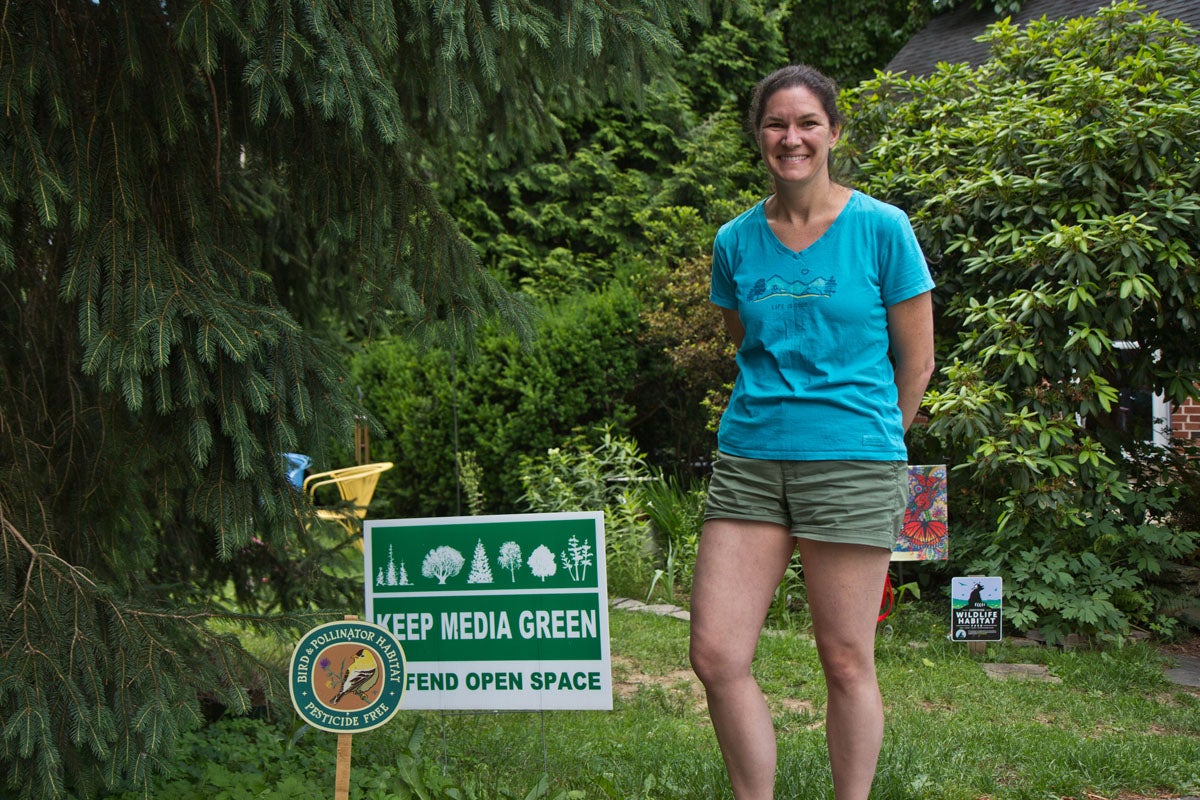
Julie Smith outside her home in Media, Pa. (Kimberly Paynter/WHYY)
Areas of tree cover and homes of varying sizes have been replaced with even larger luxury homes, said Smith, who has a background in environmental science. Local wildlife species have been displaced, she said, and the lack of trees and greenery is causing flooding to intensify and leading to the formation of sinkholes — her neighbor fell into one a few months ago, she added.
“I can’t remember how many … square acres of open space is left, and every last bit of it is vulnerable at the moment because of developers coming in. And they seem to be very well represented at council meetings, and very little seems to be able to be done to challenge them to help preserve the integrity of our town,” Smith said.
Borough Council President Brian Hall has lived in Media since the birth of his daughter nearly 25 years ago. He said there were development concerns then, which the borough managed to overcome.
“Go back about 30 years, and folks were concerned about Media being squeezed out by two malls, the Granite Run Mall to the west, the Springfield Mall to the east, that Media businesses would evaporate, that residents would continue to leave. The opposite has happened. The malls are struggling, and Media is thriving,” Hall said.
While acknowledging some of the issues highlighted by community members, he said he believes that they are largely a symptom of success rather than mismanagement.
“It’s a perfect small town. And because it’s such a desirable place, more people want to live there. And because more people want to live there, there are increases in housing prices. And there are development pressures. Media is facing the problems of a successful town,” Hall said.

Glen Providence Park in Media, Pa. (Kimberly Paynter/WHYY)
The council has been proactive and progressive in handling issues regarding the environment and open space, Hall said, pointing to the renovation of the borough-owned Houtman Park in neighboring Upper Providence Township.
Within the last 10 years, Hall said, the borough has purchased two parks as well as an outdoor sitting area near the county courthouse that has a stormwater retention feature. And within the last two years, he said, Media officials have commissioned an open space plan.
Because of continual flooding, the borough secured a grant in 2018 to help with the stormwater — but it has yet to begin the project, Smith said.
Hall begged to differ, saying that the borough has begun to address the stormwater problem through grants and stormwater mapping.
“The borough has been very attentive to the concern in her area. We’ve had our engineer out there. We spent hundreds of thousands of dollars in remediation on the stormwater in that area, even though it’s not our stormwater problem,” Hall said.
But the plan to completely fix stormwater retention is expensive, he said, and that’s part of the reason it has not been fully executed, as the borough’s budget is around $10 million.
Rita Jordan-Keller has called Media her home since 1972, when she was in her 20s. She saw the community initially fight off development, but eventually accept it — a Trader Joe’s and things of that sort. But she said it has grown out of control.
“We’ve reached a tipping point, I think, for many of us who have been here … we know that things cannot stay the same, but we want to preserve the very best that Media has to offer and that is its diversity, both in race and economics. We find that much of our green space is now being overdeveloped,” Jordan-Keller said.
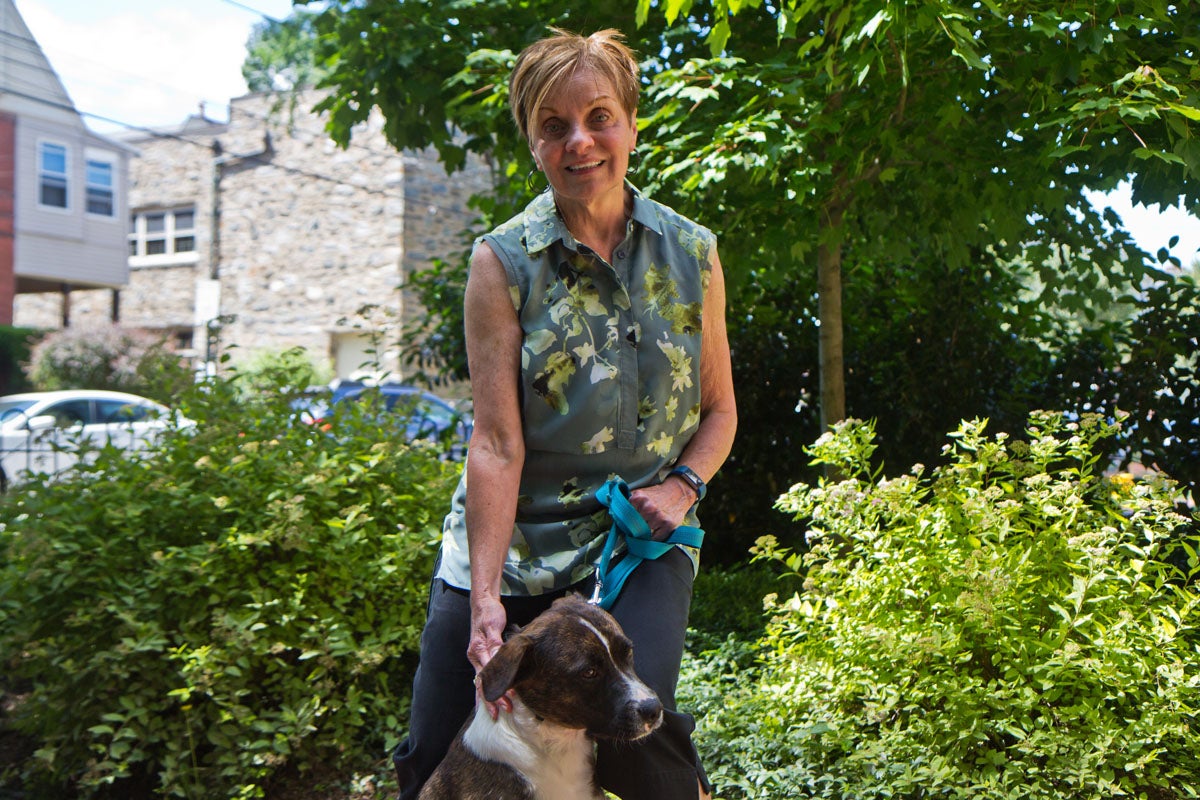
Rita Jordan-Keller with her dog Jake outside her home in Media, Pa. (Kimberly Paynter/WHYY)
Both Jordan-Keller and Smith said that they want the Borough Council to listen to them, but so far the results have been less than ideal. As a result, both joined Keep Media Green, a local organization dedicated to preserving the area’s open green space.
Terry Rumsey and Robin Lasersohn, who are married, co-chair Keeping Media Green, whose website says it was founded in 2019 as way “to preserve and protect the 45-acre green belt at the western edge of Media Borough, comprised of Glen Providence Park and the adjacent tract where Broomall’s Lake Country Club (BLCC) operates.”
According to Lasersohn, the country club was thinking about selling a portion of its land to fund its swim club operation. The goal of Keep Media Green’s first campaign was to get the borough to rezone the area from residential, which would leave it vulnerable to development, to MERC (municipal, educational, recreational, and community). The borough took action to rezone, but was sued by BLCC.
Although the borough won the legal battle, it backed off on rezoning, said Lasersohn.
“This 13.8-acre parcel of woods that surrounds this swim club remains vulnerable to housing development, and apparently, our Borough Council does not wish to exercise its zoning powers to preserve it for future generations,” Lasersohn said.
Hall said that the facts presented by Lasersohn are generally correct, but that a few key points are missing. The lawsuit was tossed on procedural grounds, not substance. Because BLCC had filed in federal court instead of state court, the federal judge ruled that court did not have jurisdiction. BLCC sued, according to Hall, because of what it felt was an “illegal zoning action.”
Ultimately, Hall said, the court never determined whether the attempt to rezone the area was legal or illegal.
“In my judgment, there is an argument there that rezoning is not consistent with its present use. And rezoning would also no doubt result in another lawsuit, which will last years and will cost the borough hundreds of thousands of dollars,” Hall said.
Rumsey and Lasersohn moved into their home in Media back in 2006, but for the last 15 years all they’ve noticed is the green-to-gray transformation of the county seat, they told WHYY.
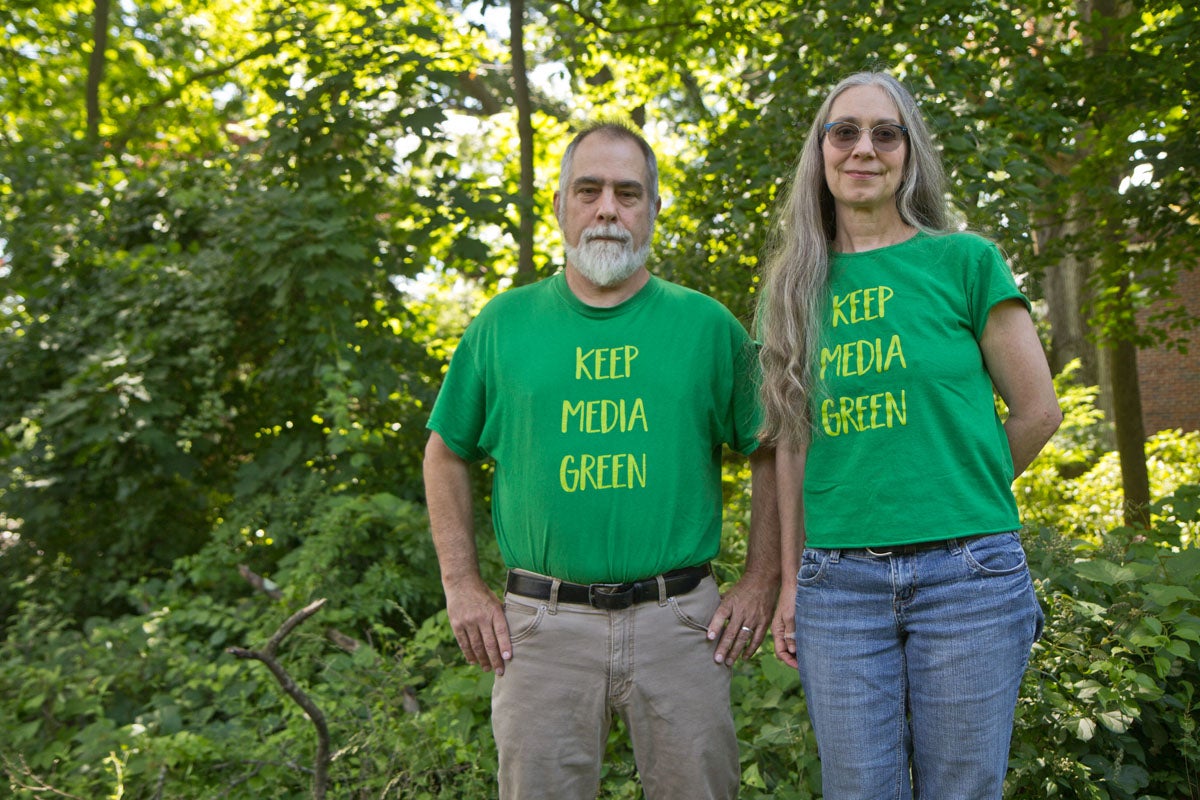
Terry Rumsey (left) and Robin Lasersohn (right) near a parcel of woods in Media, Pa., they’d like preserved. (Kimberly Paynter/WHYY)
“Now, it’s kind of at this tipping point where if it goes further, it’s going to ruin a good thing. And a lot of residents have begun to notice that and to push back. And that’s the energy that Keep Media Green has been tapping into — that pushback to say, ‘Enough is enough. Let’s restore the balance here between the natural ecology and the social ecology of the community,’” Lasersohn said.
More recently, the organization and its roughly 600 members have taken up another cause.
“Over the last six months, we’ve been trying to convince [Borough Council] to buy a 1.1-acre stand of woods and a neighborhood at Sixth Street and Centennial Avenue in Media that we lovingly call the Centennial Woods,” Rumsey said.
On Thursday night, there will be a vote on the fate of Centennial Woods, and the group is asking the community to show up to help stave off the developers.
Even though the couple said the Borough Council is favoring development, Lasersohn did acknowledge that the council recently bought a pocket of land that will be turned into a small park.
Hall said he does not see the borough purchasing Centennial Woods.
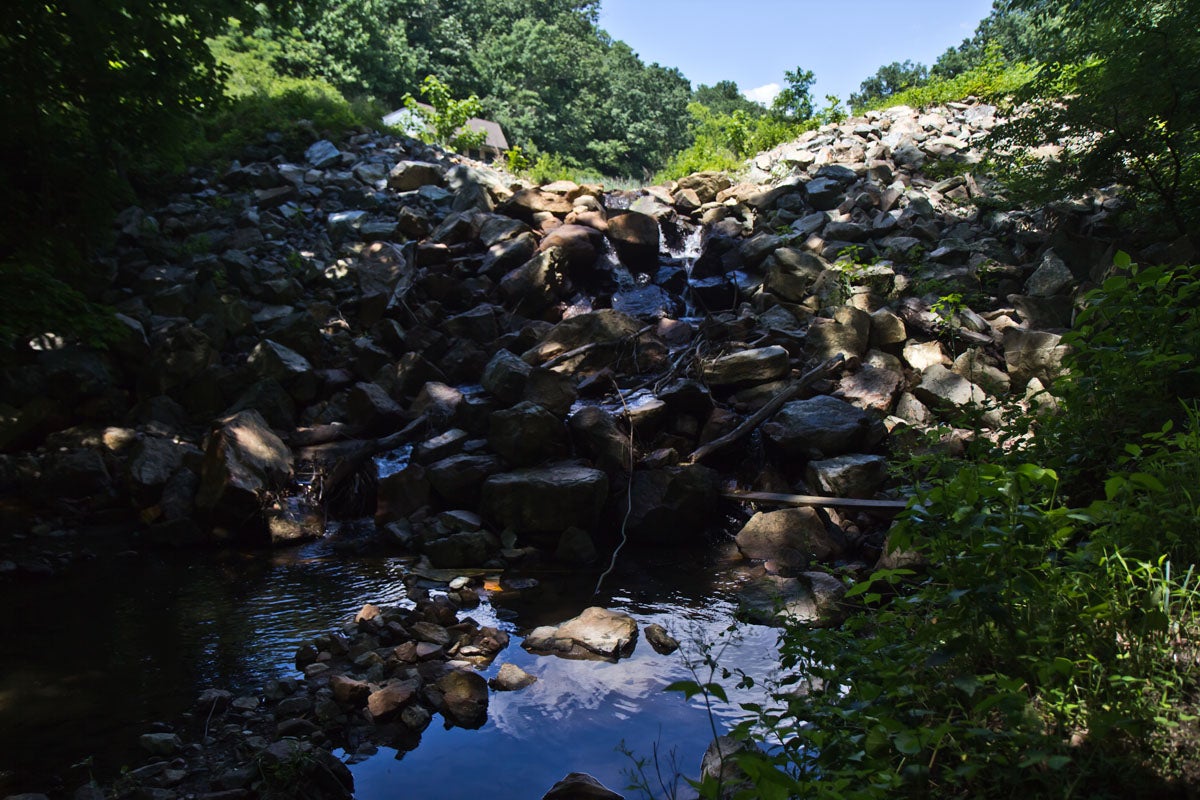
Glen Providence Park in Media, Pa. (Kimberly Paynter/WHYY)
“Bottom line for me on council is that we didn’t have that money budgeted. That’s one $1.5 million the borough does not have,” Hall said.
He noted, however, that the issue of green space is a rather complicated one.
“The most fascinating issue is the collision between the desire for open space and the desire for affordable housing, or more housing in Media Borough. There is a tension between those two impulses,” Hall said.
Though they’ve only been homeowners for the past 15 years, Rumsey and Lasersohn said they have lived in and around the borough as renters for their entire adult lives.
They said there was a point in the 1970s when everyone believed the area was destined to fail. Yet it’s still here and flourishing, said Rumsey.
Keep Media Green is explicitly focused on the ecological impact of green space being paved over for expensive homes, but Rumsey said there also is a social impact to the past decade-plus of development in the borough.
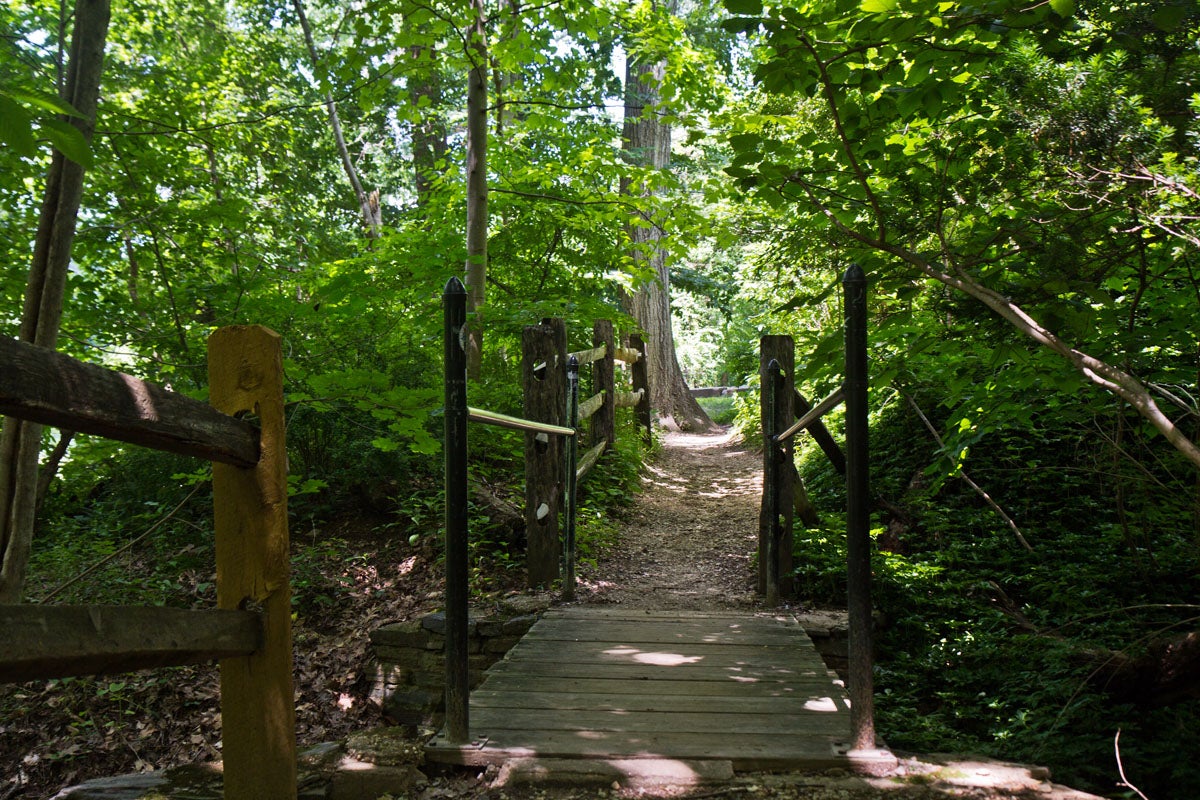
Glen Providence Park in Media, Pa. (Kimberly Paynter/WHYY)
“The diversity of our town was being lost, because more and more wealthy folks were moving into these developments designed for the wealthy. And we were losing working-class people and African Americans in our town,” he said.
Affordable housing has been a growing issue in the Philadelphia suburbs. Montgomery County recently published the results of a study that revealed skyrocketing housing prices and growing inequity across the county. Similar data for Delaware County is not as readily available.
Some residents of Media say the housing market there is far from affordable. According to the real estate website Zillow, the typical home price in the Media area is more than $476,000 — an 11.1% increase since 2020, as home prices surge throughout the Philadelphia region. In 2012, the typical home value was $305,000.
U.S. Census data from 2000 showed that 14% of Media’s residents were Black. By 2010, that number had plummeted to just 10%. As of 2019, only 6% of the population was Black.
Tamara Graham comes from a long line of Black residents of Media.
“We’ve always been here. And we’ve always done pretty much our own thing. We’ve been generally self-sufficient through segregation — through the whole nine yards of it,” Graham said.
Although she grew up walking near creeks and hiking along the neighborhood trails, she said those opportunities are shrinking for her children’s generation.
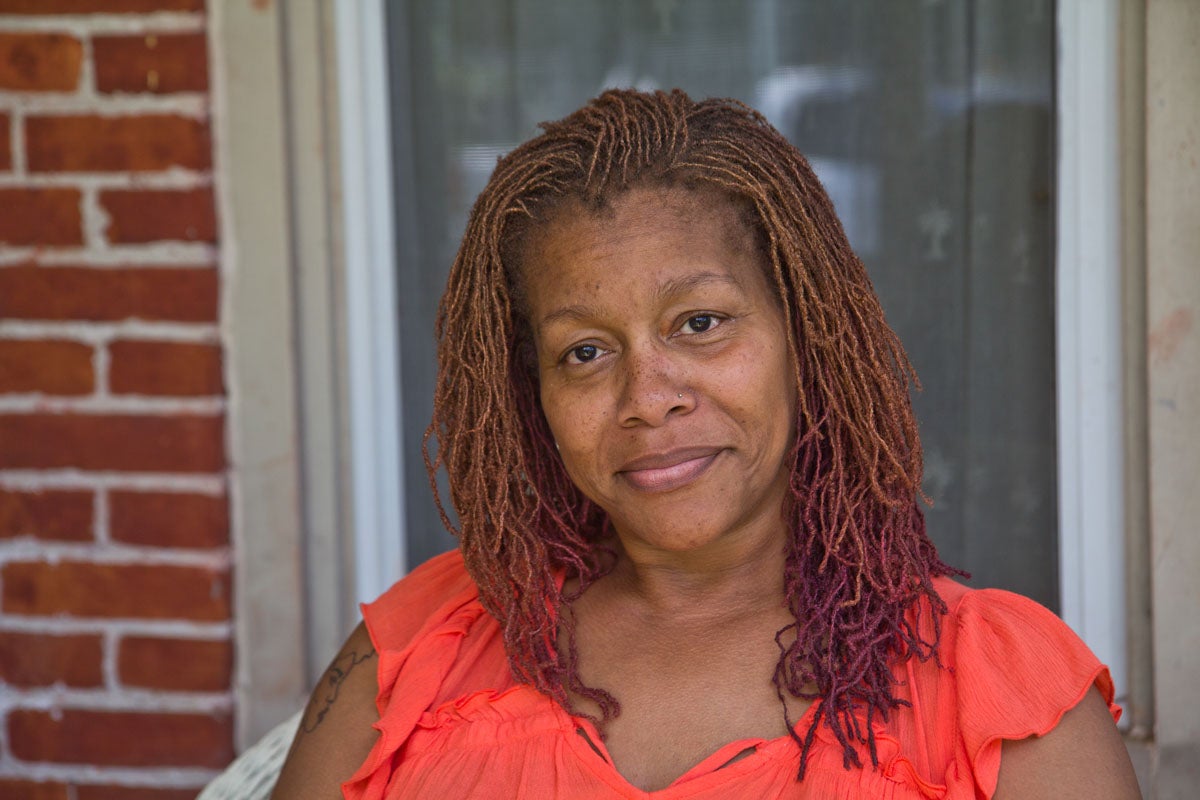
Tamara Graham on her neighbor’s porch in Media, Pa. (Kimberly Paynter/WHYY)
“There isn’t any space for kids. And when developers are being allowed into our community, and building housing that is absolutely not affordable for anybody — Black, white or otherwise — those spaces are getting run over,” Graham said.
Though it may not be the sole reason, Graham believes overdevelopment and green space loss is contributing to the lack of affordable housing and the decreasing Black population in Media.
And the developers in question aren’t passive by any means, she said.
“You have developers … wholesalers, folks coming through the neighborhood, sending letters, knocking on doors, calling to ‘Let us buy your house.’ So they buy the house at a nominal rate, and then they sell it for pretty much an exorbitant amount. And it makes a difference. I think that has a lot to do with it,” she said.
Graham wants to make it clear that what is being built is not affordable by any means, and she cautions people for thinking that a solution could be subsidized housing.
Carol Glover has been a Media resident since 1983, and what stands out to her right now is the discourse about overdevelopment. She, too, said she has seen how developers are going out of their way to purchase homes.
“There are people that are trying to buy the houses of older families that they know they’re aging out and that they’re probably going to be selling their property. They’re offering extortionate amounts for them, and it makes it really difficult for people to compete for a home,” Glover said.
She is also worried about the sharp decline in the number of her Black neighbors.
“It makes you very angry. I’m Black, and we were fortunate enough to have moved here in ’83. However, my children were interested in living in Media, and one of them was able to buy early on. But had he not, he would have certainly not been able to do so now. And that is the norm,” Glover said.
She thinks that for most families, it is nearly impossible to purchase a home in Media.

Broomall’s Lake Country Club in Media, Pa. (Kimberly Paynter/WHYY)
Borough Council President Hall said he is sympathetic to the concerns about housing affordability, and he acknowledged that it is indeed harder for the children of longtime residents to buy homes where they grew up. But he doesn’t see people getting pushed out of Media.
“It is no doubt becoming more difficult for people to buy in Media Borough, because the housing prices are just going up. That part I agree with. And I get that. But that is a function of the success of the borough,” Hall said.
He could technically act on the issue, he said, but that would have drawbacks.
“I just have to openly tell folks that there are things that I can do as a member of council to make housing prices go down. But you don’t want me to do those things,” Hall said.
Glover put the onus on locally elected leaders like Hall to resolve this issue. She said they should have known it was coming.
Hall said that hindsight is 20/20, and that the issues at hand are tricky, but he added that he has learned a valuable lesson since joining the council.
“One thing that I’ve learned about local government is this: It’s designed to go slowly. It doesn’t go slowly because we want it to go slowly. It goes slowly because we need input from our residents. It’s designed to get input from residents in a way that will maximize people’s opportunity to speak with us,” Hall said.
And though Hall said that allows for the borough to accurately understand the concerns, Glover believes her elected leaders are sitting on their hands as the pressures of overdevelopment squeeze the community.
“The borough itself does not seem to have grasped this situation and put any effort into doing anything about it. And now we’re at a point where people are really concerned about it,” Glover said. “We call ourselves Everybody’s Hometown — but that absolutely is not the case.”
This story came to WHYY through three individual responses to a callout to people living in Delaware and Montgomery counties. Get in touch and tell them about your suburban communities.
WHYY is the leading public media station serving the Philadelphia region, including Delaware, South Jersey and Pennsylvania. This story originally appeared on WHYY.org.

Get insights into WITF’s newsroom and an invitation to join in the pursuit of trustworthy journalism.
The days of journalism’s one-way street of simply producing stories for the public have long been over. Now, it’s time to find better ways to interact with you and ensure we meet your high standards of what a credible media organization should be.